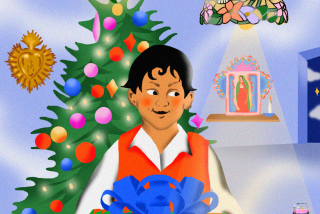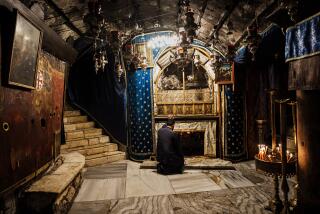Muslim Regime Says Bosnia Is No Place for Santa Claus
- Share via
BELGRADE, Yugoslavia — When the international peace coordinator for Bosnia, Carl Bildt, took a walkabout with Santa Claus the other day in downtown Sarajevo, he bore tidings of political support as well as holiday joy.
The Bosnian version of Santa Claus--actually a New Year’s Eve figure known as Grandfather Frost--has been at the center of a controversy that illuminates the country’s growing spirit of peacetime disharmony.
Muslim nationalists who control part of Bosnia’s government stand accused of discouraging the use of Santa Claus in classrooms and public festivities. Two broadcasters who hosted a radio phone-in show supportive of Santa Claus were badly beaten by, the victims believe, thugs from the ruling Muslim party.
The germs of the dispute are rooted in an open letter written last New Year’s by President Alija Izetbegovic, a devout Muslim. He criticized commercial celebration of the holidays and said Santa Claus had no business appearing on state television.
This week, Bosnia’s senior Islamic religious leader, Mustafa Ceric, published a statement advocating respect for other faiths but admonishing that Santa Claus is not an appropriate symbol for Muslims.
“Santa Claus has died,” announced the weekly newsmagazine Dani, which is often critical of the Sarajevo government. “He has been sent to the other world in a specially created coffin whose dimensions are huge. The expense of the funeral will be paid by the right-wing faction of one political party whose treasurer asks to stay anonymous.”
International officials see the Santa Claus banishment as part of a trend that is more anti-unity than anti-Christian. The ethnic nationalists dominating all Bosnian authority prefer to accentuate ethnic and religious differences, spurning the symbols that can bring people together, analysts say.
Grandfather Frost is just that kind of unifying symbol--created years ago under the Communist government of the former Yugoslavia as an alternative to religious icons that might prove divisive. He delivers gifts to Muslim, Croat and Serb children on New Year’s Eve.
But after a war fought partly along religious lines, and with ethnic partition in Bosnia solidifying each day, Sarajevo’s tradition of cultural tolerance and diversity is melting.
Of Bosnia’s ethnic groups, only the Croats, who are Roman Catholic, celebrate Christmas in December. A Croat Catholic priest was beaten up two weeks ago in Sarajevo, which is now a predominantly Muslim city, and this week someone set off a tear-gas bomb outside Sarajevo’s main Roman Catholic cathedral during midnight Mass on Christmas Eve.
Inside the church, Roman Catholic Cardinal Vinko Puljic, a Bosnian Croat, was delivering a sermon on forgiveness and the fleeting ability of people to live together.
“We call on those who have power, who have the authority and the possibility, to protect the human being, to protect the environment so that, where a man is born, he may live and die, decently and with dignity,” Puljic said.
Officially, Izetbegovic’s government said it has nothing against Santa Claus and upholds the right of all Bosnians to religious freedom.
Radio ISV, the independent station whose two broadcasters were beaten, conducted a poll in which more than two-thirds responding wanted to keep the Santa Claus character, and about half blamed the government for his demise.
Elvir Bucalo, one of the men who was attacked, said his radio station is disliked by ruling Muslims because it has challenged the government repeatedly on its efforts to impose social control.
“They feel we are a threat to the government, to the Islamic way of doing things,” Bucalo said.
Times researcher Anja Tomic in Sarajevo contributed to this article.
More to Read
Sign up for Essential California
The most important California stories and recommendations in your inbox every morning.
You may occasionally receive promotional content from the Los Angeles Times.














